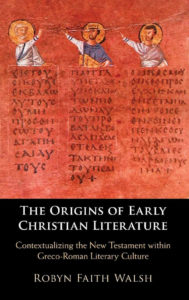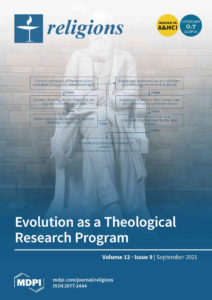Uma resenha feita por Brent Nongbri, MF Norwegian School of Theology, Religion, and Society, merece ser lida. É sobre:
WALSH, R. F. The Origins of Early Christian Literature: Contextualizing the New Testament Within Greco-Roman Literary Culture. Cambridge: Cambridge University Press, 2021, 325 p. – ISBN 9781108835305.
2021, 325 p. – ISBN 9781108835305.
e foi publicada pela Bryn Mawr Classical Review, em 11.09.2021.
Sobre o livro, diz o resumo da editora:
As abordagens convencionais dos evangelhos sinóticos argumentam que os autores dos evangelhos atuaram como porta-vozes letrados de suas comunidades religiosas. Quer sejam descritos como documentando “tradições orais” intragrupo ou preservando as perspectivas coletivas dos seguidores de Jesus de Nazaré, esses escritores são tratados como algo semelhante ao poeta romântico falando por sua comunidade – uma estrutura questionável herdada do romantismo alemão do século XIX. Neste livro, Robyn Faith Walsh argumenta que os evangelhos sinóticos foram escritos por produtores culturais de elite trabalhando dentro de um quadro dinâmico de especialistas letrados, incluindo pessoas que podem ou não ter sido cristãs. Comparando os evangelhos com a literatura antiga, seu estudo inovador demonstra que os evangelhos são obras criativas produzidas por elites cultas interessadas em ensinamentos, práticas e assuntos da Judeia após a Guerra Judaica e em diálogo com a literatura de sua época. O estudo de Walsh, portanto, preenche a divisão artificial entre a pesquisa sobre os evangelhos sinóticos e os clássicos.
Por sua vez, na resenha, diz Brent Nongbri:
Apesar do título amplo, este livro trata principalmente dos chamados evangelhos sinóticos – os evangelhos de Mateus, Marcos e Lucas. Walsh procura recontextualizar essas obras deixando de lado o modelo interpretativo comum (“míope” e “idiossincrático”) que as vê principalmente como produtos das primeiras comunidades cristãs e como fontes potenciais de informação sobre essas comunidades. Em vez disso, Walsh tenta “entender os evangelhos como literatura antiga ‘normal’ produzida por membros cultos da elite da sociedade greco-romana” (13). O projeto é pensado como “uma abordagem a esses escritos e à história que coloca em primeiro plano dados concretos sem apelar para suposições herdadas” (15).
(…)
O livro é interessante na medida em que questiona vários pressupostos profundamente arraigados e conhecidos objetivos tradicionais da pesquisa exegética sobre os evangelhos, quando, por exemplo, diz a autora: pare de pesquisar as primeiras tradições orais sobre Jesus; desista da ideia de “comunidades” associadas aos evangelhos; considere a possibilidade dos evangelhos terem sido escritos por e/ou para não-cristãos. No entanto, essa enorme quantidade de questionamentos também confere ao livro uma qualidade desigual. Todas esses pressupostos podem precisar ser derrubados, mas fazê-lo simultaneamente deixa pouco espaço para uma argumentação detalhada.
(…)
Mesmo que eu não esteja convencido sobre alguns dos argumentos de Walsh sobre autoria e cultura do livro na antiguidade romana, esses capítulos são uma leitura estimulante. O livro é altamente provocante e deve suscitar debates acalorados entre os estudiosos do Novo Testamento.
Robyn Faith Walsh é professora da Universidade de Miami.
Até aqui o livro e a resenha. Quero observar que vejo este tipo de empreendimento – o do livro, claro – com muita suspeita. Vejo uma possível tentativa, talvez mais inconsciente do que planejada, de, mais uma vez, cooptar a mensagem evangélica de Jesus de Nazaré. Como? Deslegitimando-a como expressão de comunidades formadas por pessoas oprimidas e marginalizadas que anseiam por libertação e transferindo-a para os círculos da elite do poder central do Império Romano que, na verdade, se diverte, e muito, observando o sofrimento dos outros como apenas mais um espetáculo macabro. Vigilância hermenêutica nunca é demais.
The Book:
 Conventional approaches to the Synoptic gospels argue that the gospel authors acted as literate spokespersons for their religious communities. Whether described as documenting intra-group ‘oral traditions’ or preserving the collective perspectives of their fellow Christ-followers, these writers are treated as something akin to the Romantic poet speaking for their Volk – a questionable framework inherited from nineteenth-century German Romanticism. In this book, Robyn Faith Walsh argues that the Synoptic gospels were written by elite cultural producers working within a dynamic cadre of literate specialists, including persons who may or may not have been professed Christians. Comparing a range of ancient literature, her ground-breaking study demonstrates that the gospels are creative works produced by educated elites interested in Judean teachings, practices, and paradoxographical subjects in the aftermath of the Jewish War and in dialogue with the literature of their age. Walsh’s study thus bridges the artificial divide between research on the Synoptic gospels and Classics.
Conventional approaches to the Synoptic gospels argue that the gospel authors acted as literate spokespersons for their religious communities. Whether described as documenting intra-group ‘oral traditions’ or preserving the collective perspectives of their fellow Christ-followers, these writers are treated as something akin to the Romantic poet speaking for their Volk – a questionable framework inherited from nineteenth-century German Romanticism. In this book, Robyn Faith Walsh argues that the Synoptic gospels were written by elite cultural producers working within a dynamic cadre of literate specialists, including persons who may or may not have been professed Christians. Comparing a range of ancient literature, her ground-breaking study demonstrates that the gospels are creative works produced by educated elites interested in Judean teachings, practices, and paradoxographical subjects in the aftermath of the Jewish War and in dialogue with the literature of their age. Walsh’s study thus bridges the artificial divide between research on the Synoptic gospels and Classics.
The Review:
Despite its broad title, this book is primarily about the so-called synoptic gospels—the gospels according to Matthew, Mark, and Luke. Walsh seeks to recontextualize these works by setting aside the common (“myopic” and “idiosyncratic”) interpretive model that views them chiefly as products of early Christian communities and as potential sources of information about such communities. Walsh attempts instead to “understand the gospels as ‘normal’ ancient literature produced by educated, elite members of Greco-Roman society” (13). The project is framed as “an approach to these writings and history that foregrounds concrete data without appealing to inherited assumptions” (15).
(…)
The book has a refreshing edge in that it challenges so many deeply held assumptions and traditional goals of scholarship on the gospels (stop the search for early oral traditions about Jesus; give up the idea of “communities” associated with the gospels; entertain the possibility that the gospels were written by and/or for non-Christians). Yet, that breadth of interest also gives the book an uneven quality. All of these gauntlets may need to be thrown down, but doing so simultaneously leaves little space for detailed argumentation.
(…)
Even if I am unpersuaded by some of Walsh’s arguments about authorship and book culture in Roman antiquity, these chapters make for stimulating reading. The book is highly provocative and should elicit spirited debate among New Testament scholars.
Robyn Faith Walsh is an Associate Professor at the University of Miami (UM).
